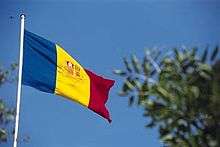El Gran Carlemany
| English: The Great Charlemagne | |
|---|---|
 | |
|
National anthem of | |
| Lyrics | Juan Benlloch i Vivó |
| Music | Enric Marfany Bons |
| Adopted | September 8, 1921 |
"El Gran Carlemany" (Catalan pronunciation: [əɫ ˈɣɾaŋ kərləˈmaɲ], Western Catalan: [eɫ ˈɣɾaŋ kaɾleˈmaɲ]; "The Great Charlemagne") is the national anthem of the Principality of Andorra. Enric Marfany Bons composed the music, while the lyrics were authored by Joan Benlloch i Vivó, written in a first-person narrative. It was adopted as the national anthem on September 8, 1921, which is also the national day of Andorra. The lyrics make reference to several key aspects of Andorran culture and history, such as the heritage of the Carolingian Empire.
Lyrics
|
|
History
"El Gran Carlemany" was composed by Enric Marfany Bons (1871–1942),[3] who was a priest.[4] The lyrics to the song were penned by Juan Benlloch i Vivó (1864–1926), who served as the Bishop of Urgell from 1906 to 1919. This position also made him an ex officio Co–Prince of Andorra.[4][5] The song was officially designated as the country's national anthem on September 8, 1921,[6][7] when it was sung at the country's cathedral for the first time.[8] The day it was adopted – September 8[4] – is the National Day of Andorra. This coincides with the feast day of Our Lady of Meritxell, the country's patron saint who is mentioned in the lyrics.[6]
Context of lyrics
The lyrics of "El Gran Carlemany" give a short account of Andorra's history "in a first-person narrative".[6] It recounts the traditional Andorran legend that Charlemagne reconquered the region from the Moors between 788[9] and 790, after the Catalan people had guided his army through the rugged valleys, which Charlemagne compensated with granting Andorra its independence,[10] and its first borders were delineated that same year.[9] It formed part of the Marca Hispanica, a buffer zone formed by Charlemagne in order to protect his state (the Carolingian Empire).[11] According to legend, he was responsible for restructuring the country, reintroducing Christianity to its people and overseeing the construction of monasteries. Because of these accomplishments, he was given "a mythical aura" and is regarded as the founder of Andorra.[12] The hymn begins with "El gran Carlemany mon pare" ("Great Charlemagne my father"),[13] and memorializes this view and celebrates the country's status as "the only remaining daughter of the Carolingian empire,"[14] since it is the only remnant of the Marca Hispanica.[11]
Notes
- ↑ Augustin's Andorra book reference incorrectly translates "Prínceps" as "princess". It should instead be "princes", alluding to the Co-Princes of Andorra.
References
- ↑ "Andorra – El Gran Carlemany". NationalAnthems.me. Retrieved May 19, 2014.
- ↑ Augustin, Byron (September 1, 2008). Andorra. Marshall Cavendish. p. 24.
- ↑ Xavier Maugendre (1996). L'Europe des hymnes dans leur contexte historique et musical. Editions Mardaga. p. 145. ISBN 978-2-87009-632-1.
- 1 2 3 Augustin (2008), p. 99.
- ↑ Lichfield, John (September 2, 2006). "The Not-so-Rough Guide to Andorra – The land that Europe forgot". The Independent. London. pp. 26–27. Retrieved May 7, 2014. (subscription required)
- 1 2 3 "Andorra". The World Factbook. CIA. Retrieved May 7, 2014.
- ↑ "Country's Profile – Andorra". Sochi2014.com. Sochi 2014 Olympics. Archived from the original on April 6, 2014. Retrieved May 7, 2014.
- ↑ Principat D'Andorra, 1278–1978: È Centenari de la Signatura Dels Pareatges – Recull Oficial D'informació. Casa de la Vall. 1978.
- 1 2 Geyer, Helen (November 2013). "Sprachpolitik und-praxis in Andorra" (PDF). Interlinguistische Informationen (in German). Diputació de Girona. 20: 68. ISSN 1432-3567. Retrieved May 8, 2014.
- ↑ Principat D'Andorra, 1278–1978: È Centenari de la Signatura Dels Pareatges : Recull Oficial D'informació. Casa de la Vall. 1978.
- 1 2 Shelley, Fred M. (April 23, 2013). Nation Shapes: The Story Behind the World's Borders. ABC–CLIO. p. 8.
- ↑ Pineda, Enric Bassegoda (2010). "Carlemany No Va Conquerir Girona". Revista de Girona (in Catalan). Diputació de Girona. 261: 39. Retrieved May 8, 2014.
- ↑ Gale Group; Moshe Y. Sachs (1984). Worldmark Encyclopedia of the Nations. Gale Group. p. 9.
- ↑ McDonogh, Gary (September 28, 2010). Iberian Worlds. Routledge.